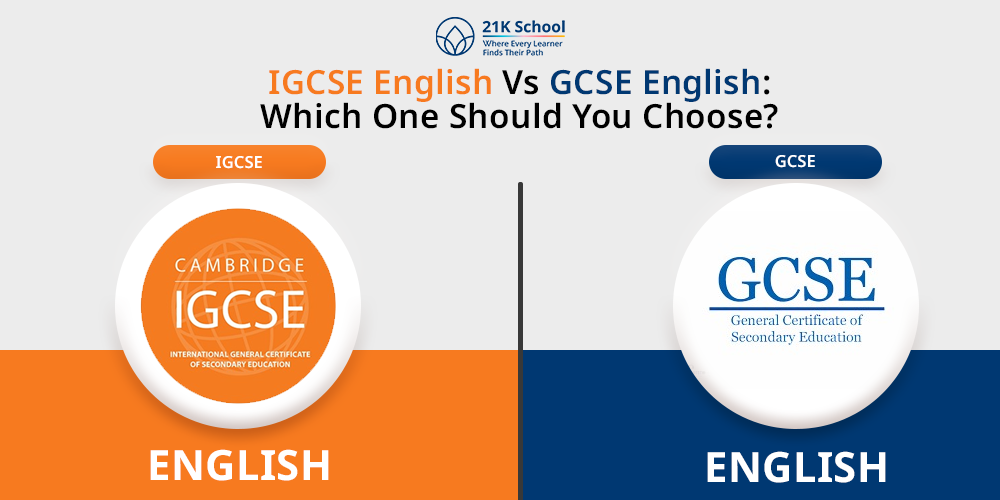
Are you too confused to select one out of IGCSE English and GCSE English? Before choosing, make sure you understand the importance of English language.
Though both of them seem similar, the difference lies in where they are applied. To explain, both IGCSE and GCSE English have equal level of qualifications, but one is universally popular, while the other, only in a couple of countries.
Children between the ages of 14-16 get to choose between both to continue their studies for higher education abroad by giving them required experience and reputation.
Read on to find out more about IGCSE vs GCSE English to find which suits best for you at the end. Also learn about the importance of grammar in English language.
Table of Contents
What is IGCSE English?
IGCSE stands as International General Certificate of Secondary Education for delivering educational qualification on the global levels.
IGCSE English offers courses that are similar to those of GCSE English but for students who need more exposure and flexibility in giving exams and have the opportunity to select universities from abroad as well.
These courses are even available online by Oxford Open Learning where students are not necessarily required to do courseworks or other assessments.
What is GCSE English?
GCSE English is a more generic form of IGCSE English for students wanting to pursue higher education in their own country the UK, or other few nations like Canada, Australia and India.
General Certificate of Secondary Education is the expanded form of GCSE, speaking for a more reserved qualification in the nation and few other places.
GCSE English courses are formulated to indulge mainly into a bit more native literature like those of Jane Eyre and Charles Dickens,however, this is different and more diverse in IGCSE English.
Even the coursework and assessments involved are both in the written and oral form for GCSE English which allows students of 16 years to take exams.
Learn benefits of learning English.
IGCSE English Vs GCSE English: Key Differences
Though the basic difference that’s clearly talked about and visible about IGCSE English vs GCSE English is its availability. The former is widely accepted globally while the latter has boundaries with the UK, Canada, Australia and India.
We will be learning about other differences that need emphasis to consider one board and continue our educational plans ahead.
| Feature | IGCSE English | GCSE English |
| International Focus | Designed for international students, particularly outside the UK. | Primarily for UK-based students. |
| Exam Boards | Cambridge (CAIE), Edexcel | AQA, Edexcel, OCR, WJEC |
| Course Content | More flexibility in the curriculum, with an emphasis on English as a global language. | Primarily focused on UK-based literature and language |
| Grading System | Grades range from A* to G and in Edexcel it is 9-1 grading. | Grades range from 9 to 1 (9 being the highest). |
| Difficulty Level | Considered slightly more challenging in terms of global applicability and diverse texts. | Generally considered more aligned with UK educational standards. |
| Course Length | Typically two years, similar to GCSE, but may offer more flexibility in completion time. | Typically two years, with a fixed timeline for all students. |
1. Course Content
- IGCSE English: The content of IGCSE English course is more diverse and curated in a form that aligns with students who have English as their second language. Also read the benefits of learning a second language.
- GCSE English: GCSE English course content offers native literature and authors from British background. William Shakespeare is not a miss in this curriculum.
2. Exam Dates
- IGCSE English: From November 2024, the exam dates have been moved to October or November from January depending on the exam board. The January Session is now available for selected subjects, mostly for Pearson Edexcel students .
- GCSE English: The GCSE English exams are taken in similar patterns to IGCSE but without the additional January exams.
3. Country Availability
- IGCSE English: IGCSE English is available and recognised in all over the world within more than 150 countries and acceptance from best universities, employers, and 6th form colleges.
- GCSE English: The UK, Canada, Australia and India are few countries having English GCSE courses of qualification.
4. Course Requirements
- IGCSE English: The required course assessment in IGCSE English is through written exams, courseworks, and oral tests having lengthy and vigorous syllabus.
- GCSE English: The new qualifications ensures that most exams will be taken at the end of a full two-year course, with no interim modular assessment, coursework nor controlled assessment
5. Grading System
- IGCSE English: To be saved from any confusions, it would be safe to say that there are two grading systems under IGCSE English as Cambridge offers the A*-G grading and Edexcel continues evaluations with 9-1 grades. To understand its complexity, read more on the IGCSE Grading system.
- GCSE English: GCSE English follows only the 9-1 system of grades.
6. Level of Difficulty
- IGCSE English: The IGCSE English seems to be a bit more challenging to young learners till 2017, but today it has negligible differences than the GCSE English final tests.
- GCSE English: Though it is still hard to even pass these exams, GCSE falls under slightly more learner-friendly assessment questions.
7. Course Length
- IGCSE English: Both the IGCSE English and GCSE English have a two-years course but the former one has no age limitation for conducting exams and learners continue to learn from where they left.
- GCSE English: It has a uniform way of offering courses under a two year plan and then compulsory exam conduction.
IGCSE English vs GCSE English: Which is Better for You?
To be honest, there is no better or worse when we are talking about the IGCSE English or the GCSE English. Both of them are highly talked of around the world for its credibility and curriculum.
What needs to be kept in attention is your career plans and in which country you are living in. This is because, clearly, one of the courses (GCSE English) is not available in most countries.
Also, if you want flexibility in exam conduction and more in-depth knowledge of English literature, you should go for IGCSE English.
But if you think your career is safe if you choose the GCSE English, learning mostly about British Literature and history you can do that too.
You just have to understand your priorities straight and mind the country’s availability, and you are good to go.
Exploring the benefits of igcse boards in India.
Concluding Thoughts
GCSE English and IGCSE English are equally valued in countries across the world.
With the varied differences in flexibility in exam attempts, levels of assessments, course plan, etc. both qualifications stand out distinctly but somehow land on the same levels.
The only fight for choosing one is the availability of whichever qualification in certain countries and flexibility in continuous learning.

